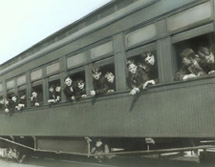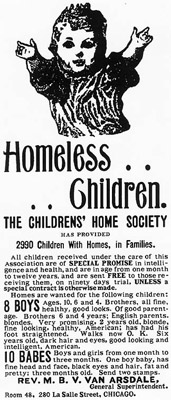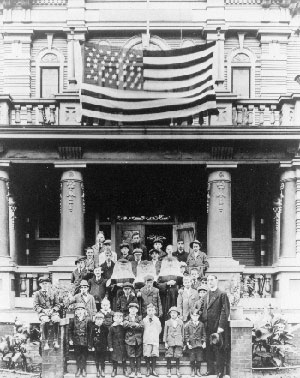"Does Anyone Want a Boy or Girl?"
"Homes spelled with an H are blessed structures, but no child ought to be raised in one," Elia Peattie noted in the Omaha World-Herald on December 20, 1895. She wrote in reference to a particular baby whom she said "belongs to nobody–actually belongs to nobody. But it ought to. Someone might give it a home for a Christmas present." The child in question had been a ward at the Burt Street Home, a type of holding facility for little ones whose parents were either in prison, dead, or otherwise "incapacitated." Mrs. Peattie further told her readers that–happily–a little girl from the home, whose mother would yet be in jail for an extended period of time, had recently been placed, at which time she had "carried in her arms her chiefest treasure, her little cat. She could not let it go by day or by night, but kept it close–her friend and confidant amid her new surroundings." [1]

Stories such as these doubtless tugged at the heartstrings of Peattie's readership, but, unfortunately, such histories were not unusual. Large numbers of orphans found themselves on the frontier during the decades adjacent to the turn of the century. In many cases, the children's parents had tried their luck in the new, Midwestern cities but had succumbed to the diseases that so often accompany poverty. Others of the older set were runaways, lost in the shuffle of Reconstruction. Still other parent-less children had actually reached Mid-American via "orphan trains" run by charities in the East. Between 1854 and 1929, more than 200,000 children were sent to the plains states from New York City via these trains. [2] Charles Loring, a young minister, had instituted the Orphan Train program in 1853 after having observed thousands of what he called "Arabs of the streets," homeless children of New York City who tried to sell matches and rags in order to survive. "The great duty," he wrote, "is to get them utterly out of their surroundings and to send them away to kind Christian homes in the country." [3] At least seven thousand children are known to have ridden orphan trains to Nebraska. [4]

Sometimes churches also assisted in this seemingly overwhelming work. The Catholic Sisterhood in New York, for example, assisted in gathering together young children, usually between the ages of two and five, whose parents had either died on the voyage across the Atlantic or who had perished shortly thereafter, and sent them to certain Midwestern cities via train. They hoped that the children would be placed with families who desired an additional child to nurture, and that they would additionally help with farm or housework, thus helping to stimulate the plains economy. Sometimes the children were placed into loving homes, but often they remained in orphanages, simply waiting. It was concerning the plight of such children that Peattie petitioned her readership.
The feeding and care of orphans was the subject of fundraising and donation drives within women's groups and churches. In 1896 Peattie conveyed the request of the Nebraska Children's Home Society, one of the first adoption homes within the state, via her column: "We wish to call the attention of our many friends and members of our boards to our need of clothing for children from infants to those of 10 or 12 years of age, both boys' and girls'...we have just received a girl ten years of age with only the few articles of clothing that she had on, and they were not very numerous...and so many times people have clothing partially worn, which their children have outgrown, that they could spare, which would help us very much in making the children more presentable...." [5]

"Do you want a boy or girl?" Peattie implored. "If there are any extra fathers and mothers, they should apply at once," she urged in 1893, referencing five-year old Johnny Stone, his sixteen-month old brother, six-year-old Willy, and a collection of other children housed at the Children's Aid Society desirous of parents and home. [6] We read her words and, though from a distance of over one hundred years, feel the urgency of her plea. Unfortunately, however, for those on whose behalf she petitioned to apply, their chance has passed. For those on whose behalf she petitioned to apply, however, the chance to become one with a family has passed.
Read Peattie's Writings
References
The Orphan Trains. Accessed 19 December 2007. http://www.pbs.org/wgbh/amex/orphan.
Nebraska State Historical Society. "Orphan Trains." Accessed 15 December 2007. http://www.nebraskahistory.org/sites/mnh/orphans
Peattie, Elia. "A Word With The Women." Omaha World-Herald. 20 December 1895: 8.
—. "A Word With The Women." Omaha World-Herald. 2 August 1896: 8.
Illustrations
"Poster Advertising Children Available for Adoption." Nebraska State Historical Society. Nebraska History.org. Accessed 20 December 2007. http://www.nebraskahistory.org/images/sites/mnh/orphan/tecumseh.jpg.
"Orphan Train Photograph." The Orphan Train Movement. A Historical Analysis. Accessed 20 December 2007. http://wotan.liu.edu/~rtalento/Index.html.
"Photograph of Orphanage on Dodge Street in Omaha, Nebraska." Notre Dame Sisters of Omaha, Nebraska: Women of Faith, Making a Difference. Accessed 21 December 2007. http://www.notredamesisters.org/history/amissions.htm.
Notes
XML: ep.owh.cha.0003.xml
